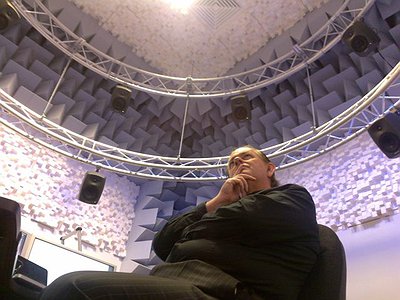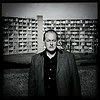Certain sounds seem to be inextricably connected to particular genres or styles of music or even to different formats, like the CD or vinyl. Do you consider these as limitations, as a given or as a compositional tool which can be used in an inventive way?
In terms of CD, vinyl or mp3 file, they're so incrementally different that I don't see what the point is, why would it make any difference? We're past all that. It's irrelevant. These ‘sounds’ are limitations to being understood – content is king. I'm not really interested in the overall sound as ‘message’.
In terms of what I would use instrumentation-wise or content-wise, well that's a bit different. With the Millennium Bridge project for example I wanted a hypnotic base to work from, like a canvas. I think an electronic canvas is the most neutral. If I was to use orchestral, firstly it's more expensive, secondly it has more expectation attached to it, more associations and that makes it a less neutral starting point.
Creating abstract works are more effective electronically because you can dissociate expectation from what you're hearing. It creates a meditative environment. Then you can overlay that with meaning, tension, timbre and textures. Our perception of sound is based on expectation, a construct that we predict. When things deviate from what we expect, that can be used as a tool artistically to engage people.
The line between production work and composition is blurring. In how much do you feel that these two areas could mutually influence and inspire each other?
Both have always been equally important in my creative career.
Budgets for productions are being reduced and more and more people are choosing to listen to music in compressed formats and on low-quality playback devices. In which way is this affecting music and how would you rate the state of production today?
Production today is easier and less careful and much of the detail is often lost. There's the loudness wars, compression rates, brick-wall limiting, the proliferation of new technology which allows you to make tracks louder and louder with less and less dynamics. It's creating a nightmare scenario really because first of all it's unnecessary and when you play the tracks in nightclubs it blows your head off and it sounds deeply unpleasant.
The beauty of dance music used to be the thrill of the dynamic change. Dynamic change happens on a macro level now, so most pop or EDM tracks, from Katy Perry to hip hop, instead of being detailed productions, with lots of dynamics, you end up with everything super-optimised from a loudness perspective. Because it's so tiring on the ear, they have to have breakdowns. I mean, it's actually affecting composition. You end up with tracks where the whole timeline is compressed and it's affecting negatively, in my opinion, how songs are constructed. Technology is restricting how we write and listen to songs. Kids are listening to music these days on a computer or headphones, and nuances are lost. It's not about detail and long-term engagement anymore, it's about short-term gratification and the gross consumption of music
The equipment-industry suggests that new equipment keeps making productions better. How much do you believe in the idea of progress in production?
I don’t – we’re going backwards. It comes mainly down to taste and economics. Taste is based on how the marketplace is going to respond to your music, what your peers think and what you think your perceived audience is. Taste is more of a commercial imperative now, not exclusively of course, there's always exceptions. But the charts now are purely market driven, it's not about innovation or interest. The stuff that has a bit more depth, like Arctic Monkeys for instance, their album sales are driven by respect for their creativity. They're not controlled by some perceived outside force. There's still room for that.
I think progress in production can happen by deliberately making more of an effort to take care, with elements like subtleties and dynamics.
It has often been suggested that "the future of music is in live”. How do you feel about the ongoing relevance of recordings as an art form?
In five years time I don't think there'll be any artefacts to buy. Apart from nostalgia-wise. Take Urban Outfitters for instance, in their Camden store they've got clothes, then on the other side of the store they've got 12 inch singles of all types in racks, all six quid, and then they're selling frames to put these things in. There's a commercial demand for the artefact. My daughter buys vinyl but she doesn’t even own a record player, she just wants them as items.
We're under the assumption that music should be free by the new generation whether we think it's morally correct or not doesn’t matter. I haven't bought a CD for 2 years. I'm part of the Featured Artists Coalition, for musician's rights, and I'm meeting with Spotify this afternoon. I'm not against Spotify, I'm against the proportion of money that reaches the artist. What's happening now is that they're dispersing money to the record companies but the record companies don't have a defined agreement with most artists about digital distribution.
Usually, it is considered that it is the job of the producer and/or engineer to make a recording sound great. But listening is also an active, rather than just a passive process. How do you see the role of the listener in the musical communication process?
Like any art form - the more you put in, the more you'll get out. I went to the Museum of Modern Art in New York recently. It's amazing. But there's a temptation to dash past each work, because they've become ciphers. Some of the famous pieces have become such a part of our cultural landscape for so long that they become icons. I like to stand in front of a painting I like and commune with it for a while. It's difficult to do that in a crowded art gallery. But you can do it with music. You can put a track on loop for an entire day if you want.
I'm not so old fashioned to say that everybody should listen to an album from beginning to end. But there's a benefit to it, if that's how the artist intended for it to be heard. Platforms like Spotify miss out on sharing the artist's intention. It's missing contextualisation. It's too facile to access without context.
Please recommend two recording/mixing/mastering engineers to our readers which you feel deserve their attention.
George Massenberg - created techniques to enable both acoustic and electronic instruments to be recorded in the most present and realistic and emotionally engaging way. Using multiple microphone techniques in studios. He also designed fantastic outboard gear.
Bob Clearmountain - one of the greatest mixing engineers of all time. He mixed thousands of albums, and had a great appreciation of the subtly and beauty of spectrally combining different frequency ranges and compressing different parts of the mix. how to make things sound beautiful in as many sonic proliferations as possible.
Keep up with Martyn's activities at his blog martynwareblog.blogspot.co.uk and his company site illustriouscompany.co.uk




